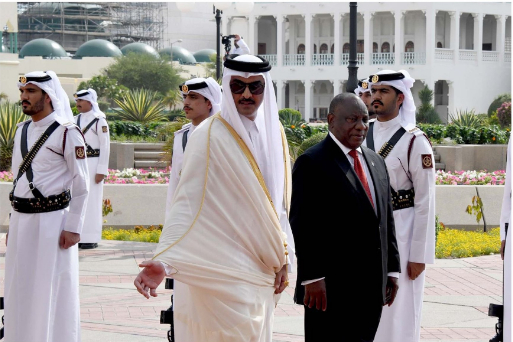
Arul Louis
New York, Nov 26 (IANS) When a contingent of Hamas hostages rode on white vans of the International Red Cross flags across the Rafa crossing to freedom in Egypt, it was a diplomatic triumph for Qatar, the odd nation out in the region with a prickly interaction with the US.
And with Washington tied down by its total support for Israel, China is trying to upstage it by raising its diplomatic profile in the region as a champion of the Muslim nations, building on the rapprochement it brokered between Iran and Saudi Arabia.
Beijing is hoping to upstage Washington by taking advantage of the sympathy for Palestine shown in the backing by 121 countries of a General Assembly resolution calling for a truce in the Gaza conflict, which the US had opposed, but later allowed a truce resolution to pass in the Security Council.
China holds the presidency of the Council for this month and led the negotiations for the adoption of the truce resolution, which had been elusive for over a month.
Egypt is a key player in the Gaza crisis, having once administered the territory.
It controls the Rafah border through which humanitarian aid can go to the territory and hostages and other foreigners and those with severe medical needs can leave it, and a sizeable chunk of the international negotiations on Gaza has centred on the crossing.
Qatar’s Prime Minister Sheikh Mohammed Bin Abdulrahman al-Thani played a key role in working out the five-day truce in the Israel-Hamas conflict and the release of the hostages taken by Hamas last month and Palestinian prisoners held by Israel, once again taking centre stage in the region’s muddy diplomacy.
The US and Israel had to reach out to the energy-rich Gulf emirate for the hostage release deal, whatever their misgivings over Qatar’s maverick international relations.
With its deft diplomacy of balancing its connections with all sides – it hosts US military bases as well as Taliban and Hamas political offices, and has close economic relations with Iran in defiance of US sanctions – Qatar has emerged as an honest broker between warring parties – or at the very least a post office for communications between those without direct contacts.
Shepherding the Gaza negotiations now is far cry from 2017 when US House of Representatives Foreign Affairs Committee approved a resolution criticising Qatar for hosting Hamas leaders.
Various US politicians have attacked Doha for hosting Hamas, but Qatar’s Ambassador Meshal Hamad Al-Thani explained on X social media platform that the channel with Hamas was established at the request of the US to maintain open lines of communication.
And last month a bipartisan group of Senators led by Senate Foreign Relations Committee Chair Ben Cardin wrote to al-Thani asking for help to free hostages.
Leading up to the US withdrawal from Afghanistan, Qatar also played host to the negotiations between the Taliban and the US, and when the arrangements collapsed into chaos, Doha came to the rescue by facilitating the airlifts of US citizens and Afghan refugees, earning it a Senate “thank you” resolution.
Qatar also played the banker in the deal between the US and Iran for freeing five Americans held by Tehran, holding the $6 billion in Iranian funds that Washington unfroze as part of the agreement.
Qatar’s Al Jazeera cable news network, a rival to the Western channels, has helped it project its perspectives to a global audience, but that itself has put it at odds with its Gulf neighbours and several countries including the U.S and Israel.
In 2017, when its neighbours led by Saudi Arabia imposed sanctions on it and broke-off diplomatic relations, one of their demands was shutting down Al Jazeera. (The sanctions have been lifted and diplomatic relations restored.)
Doha has stood apart from the Gulf neighbours who entered the US-brokered Abraham Accords – the normalisation of relations with Israel that invoked Judaism’s and Islam’s shared heritage of the Prophet Abraham.
When the 7/10 Hamas attack in Israel blew up into a full-fledged war, the administration of President Joe Biden was trying to get Saudi Arabia to join the Accord as a counter to China’s coup in getting Riyadh and Tehran to restore diplomatic relations broken off in 2016.
Now with prospects of Israel-Saudi relations receding, Beijing is making a play for a role in the Gaza crisis.
It hosted the foreign ministers of Saudi Arabia, Egypt, Jordan, Indonesia and the Palestinian Authority, as well as the secretary general of the Organisation of Islamic Cooperation for meeting on the Gaza conflict.
In a show of solidarity with Arab and Muslim nations, China had joined Russia to veto a US-sponsored resolution that did not call for a ceasefire.
South Africa is another wannabe player in the Gaza crisis.
It convened a virtual summit on Gaza of the BRICS (Brazil, Russia, India, China, South Africa) plus the six countries that will join the group next year, where President Cyril Ramaphosa turned the volume several decibels higher, accusing Israel of genocide.
Prime Minister Narendra Modi kept away from the summit, which adopted a statement condemning Israel’s actions in Gaza, but with less belligerence.






